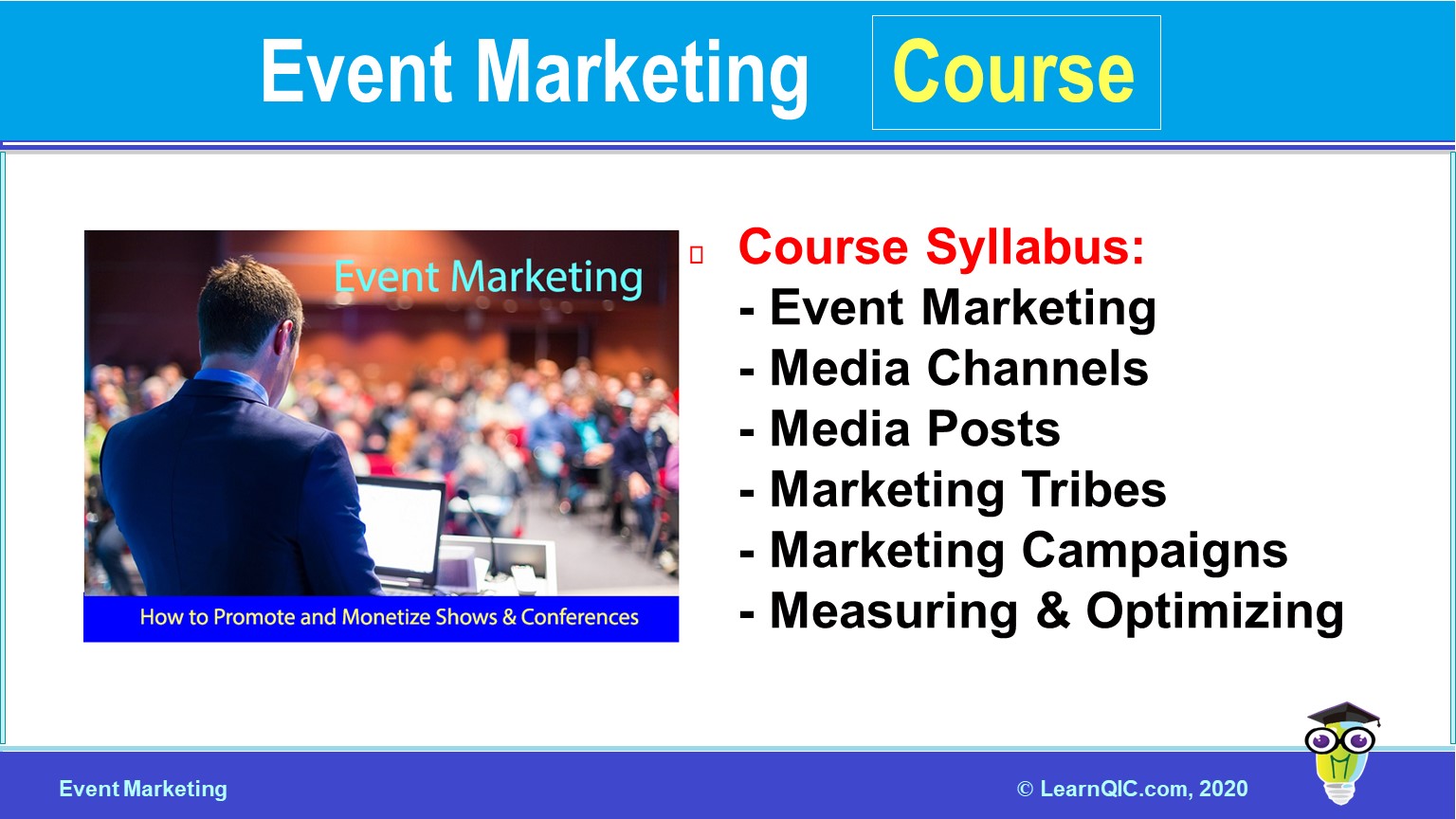
Introduction to Event Marketing
This lesson provides an overview of event owners, managers, and consultants can get more attendees, exhibitors, and sponsors.
This event marketing course is divided into 5 sections;
– Event Marketing
– Media Channels
– Media Posts
– Marketing Tribes
– Marketing Campaigns – 50+ ways to promote
– Marketing Measurements
*** There will be lots of videos, templates, and other resources published over the next few weeks.
Section 1 – Intro to Event Marketing
Key Event Marketing Options and How to Plan & Manage Them. The event marketing section describes key activities you can do to increase the number of attendees, exhibitors, and sponsors. It starts by describing planning and management documents (samples provided), the key marketing tasks, and how to create and organize your promotional materials.
Learning Objectives:
– key event marketing options
– what kind of skills and time is required
– how to measure progress and typical results
Section 2 – Media Channels
Key Media Channels for Event Promotion, Owning Them, and Ways to Manage them. Event media channels are places where customers can discover, learn, and find content or links to information about your event, workshop, conference, or trade show and related resources. Many media channels have no cost for publishing and distribution (such as Twitter messaging, blogs, discussion groups, image and video sharing). Each media channel should have a purpose, objectives, and it is helpful to have steps on how to publish and track activities.
Learning Objectives:
– Key types of media channels for event promotion
– How to find and setup media channels
– Media channel objectives and publishing processes
Section 3 – Media Posts
How to Use your Event Content to quickly Create Effective Media Posts using Templates (samples provided). Media posts are the communication messages (text, images, and/or videos) that are published on media channels. Using templates (samples provided) it is easy and fast to create more effective messages in less time. You can also use simple processes to convert messages into other formats (repackaging) that can be published on other media channels allowing you to reach many more people with your messages in less time.
Lesson Objectives:
– Key content sources for good media posts
– How to quickly create media posts from templates (samples provided)
– Ways to repackage media posts for other channels
Section 4 – Marketing Tribes
How to get People to Help you Like, Share, and Publish Media about your Event. Marketing tribes are groups of people who are willing to publish or engage with your media posts. Your tribe members can include friends, staff, vendors, advocates, and others. The type of tribe member determines what and how you can ask them to do for sharing and promoting information about your event. It is helpful to track requests that are sent (tracking spreadsheet template provided), use and update invite and reminder messages (sample scripts provided), and to limit the number of times you ask your tribe to help you.
Learning Objectives:
– Types of people who can help you
– Ways to get your tribe members to help you
– How to create media posts that other people will publish
Section 5 – Marketing Campaigns
50+ Marketing Activities (campaigns), How they Work, and Guides & Samples to help you do them. Marketing campaigns are groups of tasks and processes that are setup to manage the distribution of promotional messages and interact with desired audiences. 50+ event marketing campaigns, their processes, and helpful tools are covered in this section.
Learning Objectives:
– 50+ key types of event marketing campaigns
– How to setup & run marketing campaigns
– Key marketing campaign tools
Section 6 – Marketing Measurements
How and What to Measure, Key Tools (most free), and How to Improve your Book Promotion Activities. This section covers how to monitor, analyze, and try changes in marketing activities to improve results. Marketing measurements can include awareness (impressions), website visitors, engagement (visitor click paths and interests), leads (submitted contact information), and conversions (sales and other desired activities).
Learning Objectives:
– important types of event marketing measurements
– measurement tools and services
– how to analyze and update promotion activities”
